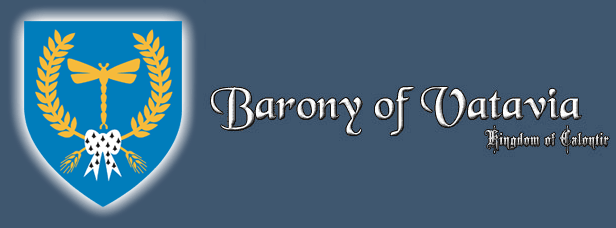
So You Want to Know about Thomas Bacon?
by Friar Thomas Bacon (David Moreno)
Orignally published in the November 2000, A.S. XXXV issue of the Dragonflyre, a publication of the Barony of Vatavia.
In the overall course of history, Thomas Bacon was a bit player, having no influence on the events of his time. But for today’s historian, Thomas looms large. For it is through his efforts that we have many of the writings of his more famous contemporaries. He also has left us many valuable descriptions of everyday life.
Thomas was born sometime in the 1270’s to a middle-class peasant family in northern England, not far from York. The names of his parents and sister are unknown. His older brother, Geoffrey, became a master mason and Thomas hints of having a younger brother, but says nothing about him. Research indicates that he might have been Robert the Bold, a noted mercenary.
Thomas is mentioned as being at Oxford in 1294 as a student. About three years later, he joined the Franciscan Friars. Late in his life, in a passage on his treatise on university life, Thomas recounts the reasoning behind these early decisions:
"As I was growing up, I came to the conclusion that farming required too much work and so looked to other means of living. The life of a man-at-arms, while offering fame and glory, also imperil life and limb. The life of a merchant offers the excitement of travel, carries with it hardships, uncertainties, and worry. So I embraced the life of a scholar. After spending some time at the university, I came to appreciate the advantages of wearing the cloth, so after deliberation, joined the Franciscans, as they were the most tolerant of all the orders." 1
In 1300, hearing of the Great Jubilee declared by Pope Boniface VIII, Thomas went to Rome, stopping for a while at Paris. Afterwards, after visiting several cities in northern Italy, Thomas left for the Holy Land from Venice. Despite their being in Moslem hands, he managed to visit both Egypt and Jerusalem. After stopping off in Rhodes, Thomas then went to Constantinople and spent several years there.
Leaving Constantinople, Thomas went up the Danube River, spending time in Bohemia and Germany before returning to Paris in 1310. After spending a few years there, Thomas returned to England and settled at Cambridge.
The next 19 years were the most productive of his life. It was during this period that Thomas wrote about his travels, noted the details of everyday life, and oversaw the copying editing of the works such people as Robert Grosseteste, Roger Bacon, and Duns Scotus.
In 1331 Thomas was called to the court where he labored for seven years on several projects. Thereafter Thomas disappears from the records, and the date of his death is unknown.
Such was the life of Thomas Bacon, a minor figure in history and a major figure in historiography. While much of his own work was unoriginal, he preserved much that otherwise would have been lost. For were it not for people like him, our understanding of history would be poorer and our ability to learn from history hindered.
Footnotes
1. Vitae Scholarium. Trans. David Moreno. Wichita: SCA Publications, 1981. ^
Copyright © 1997 - present His Lordship Friar Thomas Bacon (David Moreno). All rights reserved.